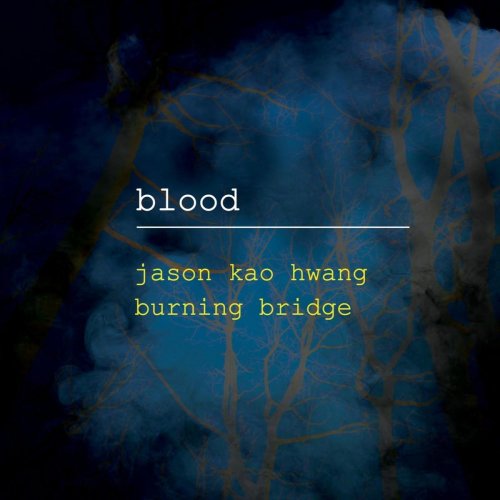
Jason Kao Hwang & Burning Bridge - Blood (2018)
BAND/ARTIST: Jason Kao Hwang & Burning Bridge
- Title: Blood
- Year Of Release: 2018
- Label: True Sound Recordings
- Genre: Free Jazz
- Quality: 320 / FLAC (tracks)
- Total Time: 47:52
- Total Size: 110 / 260 Mb
- WebSite: Album Preview
Tracklist:
1. Breath Within the Bomb (12:32)
2. Surge, Pt. 1 (7:12)
3. Surge, Pt. 2 (7:17)
4. Evolution (11:12)
5. Declarations (9:39)
1. Breath Within the Bomb (12:32)
2. Surge, Pt. 1 (7:12)
3. Surge, Pt. 2 (7:17)
4. Evolution (11:12)
5. Declarations (9:39)
As the follow-up to his Burning Bridge octet's eponymous debut (Innova, 2012), violinist Jason Kao Hwang has created another ambitious and wide-ranging work. As befits the title Blood, it constitutes a personal meditation on weighty subject matter, precipitated by a narrowly-avoided car accident which caused Hwang to consider the wartime experiences of his mother in China.
The result is a complex, but gripping, continuous ensemble performance of what the liner notes call "28 staged scenes," tracked in five sections. In many ways it recalls the widescreen narrative and overall effect of some of trumpeter Wadada Leo Smith's large scale compositions, such as Rosa Parks: Pure Love (TUM, 2019). Sudden unisons, processional marches, fiercely swinging passages and improvisatory features for the band loom from Hwang's carefully-scored explorations of texture. Both the instrumentation and the material unite west and east, reflecting Hwang's Asian American heritage.
The deep opening rumble of "Breath Within The Bomb" invokes danger and impending doom. Bassist Ken Filiano's creaking bowing and Joe Daley's tuba reverberations make it all too easy to imagine violent explosions. The track ends in similarly harrowing terrain, after lighter dialogues, like those between Taylor Ho Bynum's muted cornet and Daley's growling tuba, or Sun Li's cascading pipa and the leader's rippling violin.
Hwang contrasts stately sequences invoking traditional Chinese music with jazzier interludes suggesting informality, dance and freedom. That is particularly the case in the most spirited section, "Evolution," which in its eleven-minute duration moves between a corkscrewing riff, a splendidly expressive cornet solo, a funky violin groove, Wang Guowei's erhu spiraling elegantly over a buoyant beat, and rootsy call-and-response across band.
Such tracts of sustained emotional tone make mood switches all the more impactful when they occur, like the shift of focus from jaunty pipa at end of "Surge, Part 1" to doleful tuba at start of "Surge, Part 2." The same cut also contains opportunities for interaction between subsets of the ensemble, like that between Steve Swell's rambunctious trombone, Guowei's voice-like erhu and Filiano's dark arco, and finishes with a bombastic solo by drummer Andrew Drury.
When it arrives, the ending to the piece is low key and enigmatic; mournful violin and erhu consort with an ominous cymbals-and-bass-drum roar, hanging in the air like a question mark.
The result is a complex, but gripping, continuous ensemble performance of what the liner notes call "28 staged scenes," tracked in five sections. In many ways it recalls the widescreen narrative and overall effect of some of trumpeter Wadada Leo Smith's large scale compositions, such as Rosa Parks: Pure Love (TUM, 2019). Sudden unisons, processional marches, fiercely swinging passages and improvisatory features for the band loom from Hwang's carefully-scored explorations of texture. Both the instrumentation and the material unite west and east, reflecting Hwang's Asian American heritage.
The deep opening rumble of "Breath Within The Bomb" invokes danger and impending doom. Bassist Ken Filiano's creaking bowing and Joe Daley's tuba reverberations make it all too easy to imagine violent explosions. The track ends in similarly harrowing terrain, after lighter dialogues, like those between Taylor Ho Bynum's muted cornet and Daley's growling tuba, or Sun Li's cascading pipa and the leader's rippling violin.
Hwang contrasts stately sequences invoking traditional Chinese music with jazzier interludes suggesting informality, dance and freedom. That is particularly the case in the most spirited section, "Evolution," which in its eleven-minute duration moves between a corkscrewing riff, a splendidly expressive cornet solo, a funky violin groove, Wang Guowei's erhu spiraling elegantly over a buoyant beat, and rootsy call-and-response across band.
Such tracts of sustained emotional tone make mood switches all the more impactful when they occur, like the shift of focus from jaunty pipa at end of "Surge, Part 1" to doleful tuba at start of "Surge, Part 2." The same cut also contains opportunities for interaction between subsets of the ensemble, like that between Steve Swell's rambunctious trombone, Guowei's voice-like erhu and Filiano's dark arco, and finishes with a bombastic solo by drummer Andrew Drury.
When it arrives, the ending to the piece is low key and enigmatic; mournful violin and erhu consort with an ominous cymbals-and-bass-drum roar, hanging in the air like a question mark.
Year 2018 | Jazz | FLAC / APE | Mp3
As a ISRA.CLOUD's PREMIUM member you will have the following benefits:
- Unlimited high speed downloads
- Download directly without waiting time
- Unlimited parallel downloads
- Support for download accelerators
- No advertising
- Resume broken downloads


